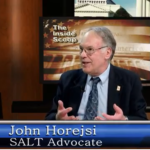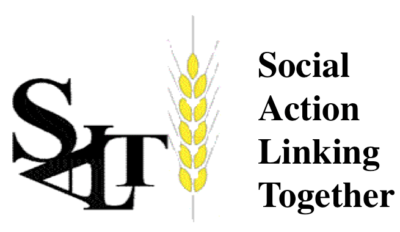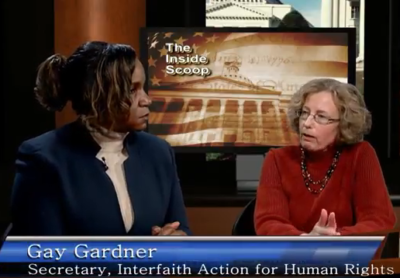SALT and IAHR – Go Out and Do Good
(Dec. 25, 2017) Catherine Read speaks with John Horejsi, Executive Director of Social Action Linking Together (SALT) and Gay Gardner and Kimberly Jenkins Snodgrass of the Interfaith Action for Human Rights (IAHR) to talk about their legislative initiatives for the upcoming year. Catherine inspires her audience to “Go Out and Do Good” during this holiday season by supporting the organizations that work to improve the conditions of those who are marginalized in our society.
 In the first segment, Catherine speaks with John Horejsi to talk about SALT’s history and upcoming legislative issues. SALT was founded in 1983 after faith groups came together to solve problems in Virginia regarding food stamps. It took their coalition 3 years to get their issue addressed and resolved, and in the process learned a lot about how to effectively lobby and bring together lawmakers to solve some of the systemic problems in our society. Their work focuses on the most marginalized citizens, who often have no voice in the area of public policy debate. SALT is a multi-faith effort, bringing together Christian, Jewish and Muslim groups who want to work toward change.
In the first segment, Catherine speaks with John Horejsi to talk about SALT’s history and upcoming legislative issues. SALT was founded in 1983 after faith groups came together to solve problems in Virginia regarding food stamps. It took their coalition 3 years to get their issue addressed and resolved, and in the process learned a lot about how to effectively lobby and bring together lawmakers to solve some of the systemic problems in our society. Their work focuses on the most marginalized citizens, who often have no voice in the area of public policy debate. SALT is a multi-faith effort, bringing together Christian, Jewish and Muslim groups who want to work toward change.
Horejsi shares that SALT will often pick two or three issues to focus on in at any given time. They work hard to fully understand all aspects of any issue, and often compromise and bring people together to find optimal solutions. The organization provides fall and spring trainings to faith groups who want to organize and work in their coalition.

The second issue that they are working on is the elimination of Lunch Shaming. This is the practice where schools send home notes with children, often in bright colored paper pinned to their jackets or backpacks, indicating that the child owes money for lunches. This creates a stigma and shames the child. SALT aims to end this practice and require that the school deal directly with the parents on these types of issues, instead of putting the children in the middle of solving the collection problem.
The final issue that will be addressed this year is a Scholarship Pilot Program, where welfare funds from the TANF (Temporary Assistance for Needy Families) would be allocated to scholarships for college or technical schools, for students whose families qualify. This gives students from poor families, who otherwise might not have the opportunity to seek higher education, an incentive to do well in high school so they could earn a scholarship. This is a way to help lift students up and hopefully break the cycle of poverty in their family.

The commonwealth of Virginia ranks 13th in the country for use of solitary confinement, so Gardner and Jenkins-Snodgrass would like to see the practice used less frequently. They have also found that the system is not very transparent, so if an advocate is looking for information about a certain case it is often very hard to understand what is happening and why these punishments are being issued. They are working hard to improve this process. IAHR has formed a coalition with SALT, ACLU (American Civil Liberties Union of Virginia), Virginia Council of Churches, Virginia Cure and NAMI (National Association of Mental Illness – VA Chapter) to address these issues.
As their coalition continues to assess the landscape with the new makeup in the House of Delegates, they plan on identifying partners who can work together with them to push forward more progressive policies in relation to use of prolonged isolation in the prison system. Their goals also include improving transparency and helping inmates successfully re-enter society after paying their dues for the crimes that they committed.